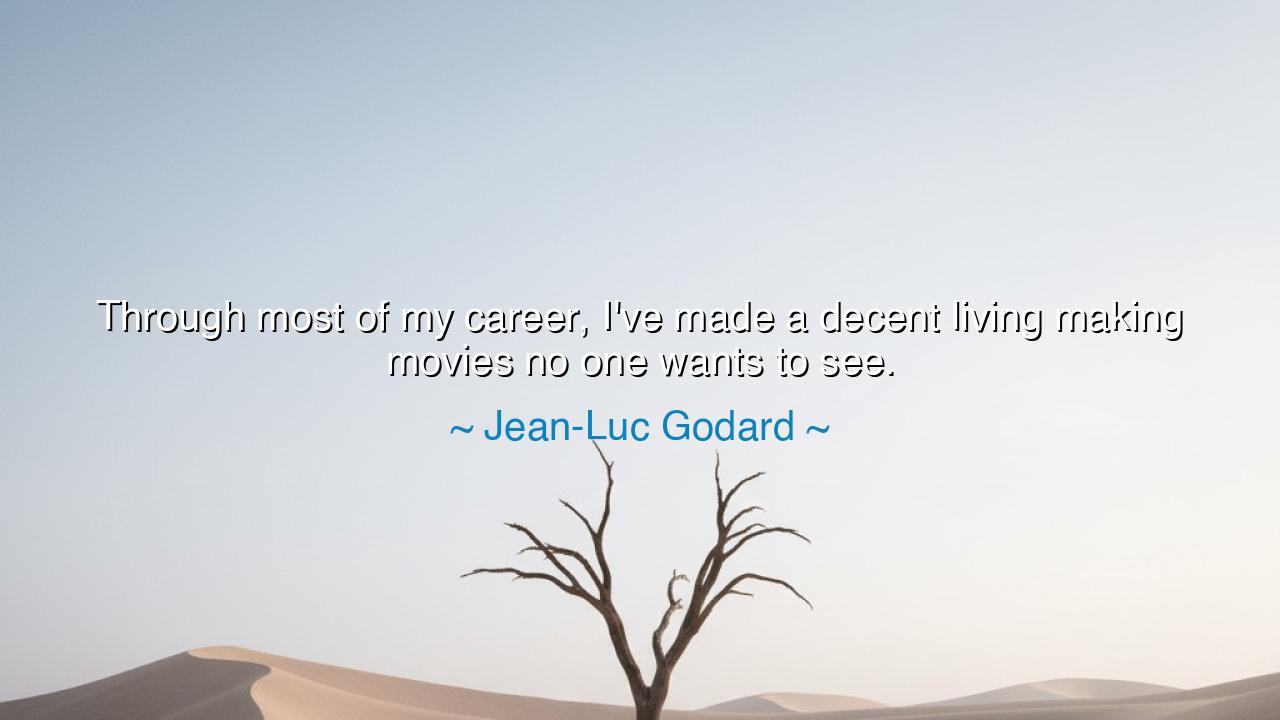
Through most of my career, I've made a decent living making
Through most of my career, I've made a decent living making movies no one wants to see.






Children, gather close, for I speak to you of a great truth found in the words of Jean-Luc Godard, a master of the cinematic arts. He once said, "Through most of my career, I've made a decent living making movies no one wants to see." These words carry within them a profound reflection on art, purpose, and the nature of success. Godard, one of the pioneers of the French New Wave, created films that were not always beloved in his time, nor readily understood by the masses. Yet, despite the lack of wide acclaim, he continued to create, to pursue his craft, and to challenge the boundaries of cinema. His words speak to a greater philosophy: that true success is not always measured by the applause of the crowd or the commercial success of one’s work, but by the integrity with which one follows their vision.
Consider, children, the story of Vincent van Gogh, whose paintings were largely ignored and undervalued during his lifetime. He, too, was misunderstood by the world, and his works were often dismissed by critics and the public alike. Yet, Van Gogh persisted, driven not by the desire for fame or wealth, but by an unrelenting passion for expressing his inner vision. Though his paintings may not have been appreciated during his lifetime, today they are considered some of the most important in the history of art. Like Godard, Van Gogh’s true legacy lies not in the marketability of his work but in his commitment to creating honestly and fearlessly, regardless of whether the world was ready to receive it.
This, children, is the essence of Godard's statement: that art is not about pandering to the crowd or creating something simply to be seen and admired. It is about the truth the artist feels compelled to express, regardless of the reception it might receive. The Roman poets understood this well, for many of them wrote not for the praise of emperors or the approval of the people, but because they were driven by a need to give voice to their thoughts, to speak truths that transcended their time. Horace, for instance, wrote poems that reflected both the joys and the struggles of the human condition. His work, though it may not have always been celebrated in his day, has endured because it was honest and timeless, much like the work of Godard.
In this, children, there is a great lesson: that art—whether in film, painting, music, or any other form—is not always about popularity or success in the conventional sense. The path of the artist is often one of solitude, struggle, and sacrifice. But it is through this path, through this commitment to integrity and vision, that the artist creates something that endures. Like the ancient sculptors who labored over their marble creations, sometimes for years, and yet faced criticism for their unconventional methods, Godard faced a similar fate in his work. His cinematic creations did not conform to traditional norms, and yet it is through his experimentation and refusal to follow the mainstream that his films continue to inspire generations of filmmakers.
The lesson, children, is that the true measure of success is not the applause of the crowd or the profit one makes, but the ability to stay true to one’s own vision. In life, you may encounter many who try to define what success looks like, who tell you what is worthy of your time and effort. But, like Godard, you must learn to trust your own voice, to create without concern for validation from others. Success is not always immediate, and true art often takes years to be fully recognized. The journey of the artist is often one of longevity, where the meaning of one’s work becomes clearer only with the passing of time.
Children, as you move forward in your own journey, know that you, too, will face moments where the world may not understand your vision. You may create something that is misunderstood or rejected, but this should not discourage you. Instead, let it fuel your resolve to stay true to your own path. Do not seek comfort in the approval of others; instead, seek the courage to stand firm in your own beliefs. Whether you choose to pursue art, philosophy, science, or any other path, remember that it is your dedication to truth and integrity that will define your legacy, not the immediate approval of the world.
Finally, children, take this wisdom with you: the world may not always recognize greatness in its time, but true greatness lies in the perseverance to create what you believe in, no matter the obstacles or the lack of immediate recognition. Like Godard, like van Gogh, and like the poets and philosophers of the ancient world, you must create not for the world’s applause, but for the truth within you. In the end, it is not the success of the moment that will define you, but the authenticity with which you live and create. Let that be your guide.






AAdministratorAdministrator
Welcome, honored guests. Please leave a comment, we will respond soon